
Metal detecting for gold can be an exciting and rewarding hobby. Whether you are a novice or an experienced prospector, understanding the ins and outs of metal detecting for gold can greatly increase your chances of success. In this article, we will explore the essential aspects of metal detecting for gold, including the necessary equipment, optimal locations, techniques, and tips to maximize your findings.
Secret #1 – Can Metal Detectors Detect Gold?
Yes, metal detectors can detect gold due to its decent electrical conductivity. However, regular metal detectors may struggle to detect small gold pieces or gold in highly mineralized soil. For these challenging conditions, a metal detector with high frequency and good discrimination capabilities is necessary. Understanding the features your metal detector should have is crucial, especially when dealing with difficult ground conditions. Additionally, knowing the locations where gold is likely to be found will save you time and effort.
Using a Metal Detector to Find Gold
By using a metal detector specifically designed for gold prospecting, individuals can increase their chances of finding this precious metal. These detectors often have greater sensitivity and specialized features that can help you detect even the smallest traces of gold. To start gold metal detecting, you need the right equipment. Investing in a high-quality metal detector designed specifically for gold prospecting is crucial.
So what do you look for in a Metal Detector?
Secret #2 – What Is The Best Metal Detecting For Gold Frequency?
In the context of metal detectors, when talking about frequency, it refers to the rate at which the detector’s search coil generates and receives electromagnetic signals. This is measured in kilohertz (kHz). The frequency of a metal detector plays a crucial role in determining its sensitivity and effectiveness in detecting different types of metals and objects.
Which Frequency is Best When Metal Detecting For Gold?
Gold metal detectors operate at higher frequencies than standard detectors. Frequencies between 15 kHz and 100 kHz are ideal for detecting small gold nuggets. Generally, lower frequencies penetrate deeper into the ground, making them ideal for larger and deeper gold targets. Higher frequencies, on the other hand, are better suited for smaller gold pieces closer to the surface. Selecting the appropriate metal detector frequency depends on various factors, including the size of the gold you’re targeting and the ground conditions. Here’s a breakdown:
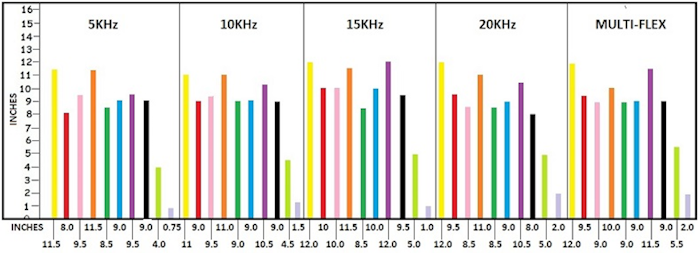
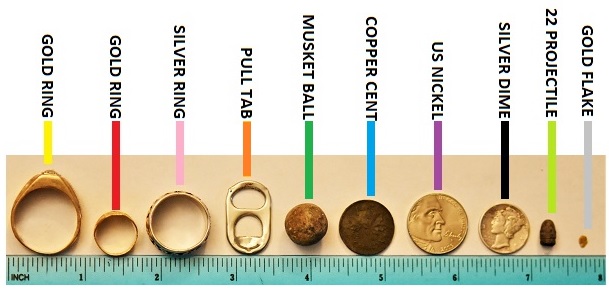
- Low Frequencies (Below 10 KHz): This frequency range is ideal for larger gold objects and deep detection in mineralized soil. It’s also great for general-purpose metal detecting where small gold is not the primary target.
- Mid Frequencies (10 KHz – 18 KHz): This frequency range balances sensitivity to both larger and smaller gold objects. It’s also very versatile for various metal-detecting applications.
- High Frequencies (Above 18 KHz): This frequency range is optimized for small gold nuggets and fine gold particles. You will also want to use a high-frequency detector for prospecting in gold-rich areas with high mineralization.
Secret #3 – Does The Coil Size Matter?
In the realm of metal detecting for gold, especially when searching for gold, mastering advanced techniques like coil swapping and size selection can significantly enhance your success rate. These strategies involve tailoring your equipment to better suit the specific conditions you are detecting in, thereby maximizing your chances of finding gold and other valuable treasures.
Understanding Coil Swapping
Coil swapping involves changing the search coil on your metal detector to better match the conditions of your search area. Different coils can offer various benefits depending on the terrain and the type of targets you are seeking. By selecting the appropriate coil for the environment, you can optimize your detector’s performance and increase the likelihood of making valuable finds.
The Importance of Coil Size Selection
The size of your search coil plays a crucial role in determining the effectiveness of your metal detecting for gold efforts. Different coil sizes offer distinct advantages based on the terrain and the size of the gold you are searching for:
- Larger Coils: Ideal for covering large areas quickly, larger coils are excellent for detecting deeper targets. They are perfect for open fields or wide expanses where speed and depth are essential. These coils generate lower frequencies, emitting larger waves that penetrate deeper into the ground, making them suitable for finding bigger gold nuggets buried at greater depths.
- Smaller Coils: Best suited for navigating tight spaces and pinpointing small, shallow targets, smaller coils operate at higher frequencies. They are particularly useful in areas with dense vegetation, rocky terrain, or when searching for tiny gold nuggets or flakes. These coils provide higher precision and sensitivity, allowing you to detect smaller finds that might be missed by larger coils.
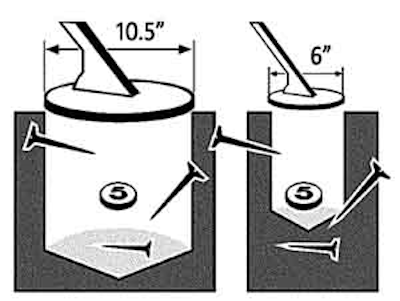
Benefits of Coil Swapping and Size Selection
By experimenting with different coil sizes and swapping them out as needed, you can tailor your metal detecting for gold to the specific conditions of your search area. This customization enhances your detector’s ability to identify various targets, increasing your chances of finding gold. Here are some key benefits:
- Optimized Performance: Adjusting your coil size to match the terrain and target size optimizes your detector’s performance, improving its sensitivity and depth penetration.
- Increased Efficiency: Larger coils allow you to cover more ground quickly, while smaller coils enable you to focus on specific areas with greater accuracy.
- Enhanced Precision: Smaller coils provide higher precision, making it easier to detect small gold nuggets or flakes in difficult-to-navigate areas.
- Adaptability: Being able to swap coils allows you to adapt to changing conditions and target different types of gold finds effectively.
When it comes to metal detecting for gold, bigger is not always better. The fact is, using a smaller coil can be extremely advantageous, especially when hunting for smaller gold nuggets or flakes. These tiny pieces of gold can be easily overlooked by larger coils, but a smaller coil allows for more precision and sensitivity.
If you purchase a metal detector, some kits like the Fisher Labs GOLDBUG Pro Coil Combo come with both a large 10″, and small 5″ coil.
Secret #4 – Which Is The Best Budget Detector For Metal Detecting For Gold?
If you are working with a budget and plan on metal detecting for gold, get the best detector you can afford. Don’t scrimp when it comes to quality and don’t let a false sense of urgency force you into buying a detector that doesn’t perform for you. Buy the best metal detector you can afford.
I’ll be looking to upgrade my metal detector shortly. I bought my Bounty Hunter Quick Draw II years ago, not knowing what I do today about metal detectors. I’d rank this one towards the bottom of the list for metal detecting for gold. But Bounty Hunter considers this an advanced model capable of finding gold.
I will say this. When I upgrade, my choice will be the Fisher Labs Gold Bug Pro combination. I think it’s the best value for my money. And if you look around a bit, you find it’s a very popular choice among gold prospectors
About this list. This is not an analytical “gold-tested” list. I’ve culled these from several YouTube videos and websites and these are the recommendations the several content providers have made. I’m keeping it under $1500. These are ranked by cost. So without further ado, here goes:
Minelab Gold Monster 1000 Metal Detector
 Retails for Approximately $1500
Retails for Approximately $1500
– GM 10 (10″ x 6″ Double-D) Search Coil
– GM 05 (5″ Double‑D) Search Coil
– 2-Year Warranty
– Headphones
– Lithium-Ion Battery
– An 18 kHz detector will normally have a depth advantage on nuggets ≥ 1.0g over a basic mid-frequency detector, and a 71 kHz detector will have a depth advantage on nuggets ≤ 0.1g. The advanced GOLD MONSTER 1000 uses an intermediate 45 kHz frequency AND a high-speed 24-bit signal processor. This primary combination greatly boosts sensitivity to gold beyond that of other single frequency VLF detectors over a wide range of nugget sizes, without introducing excess noise and false signals.
– Excellent for small gold nuggets.
For more information on Nokta metal detectors check out minelab.com
XP ORX Metal Detector
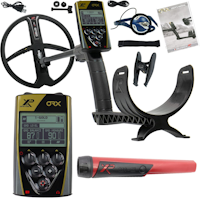 Retails for Approximately $700
Retails for Approximately $700
– Frequency: 3.7 kHz to 27.7 kHz
– 9″ X35 Search Coil
– Back-lit Display
– FX-02 Wired Backphone Headphones
– MI-6 Pinpointer
– Wireless and versatile.
For more information on XP metal detectors check out XPMetaldetectors.com
Nokta Makro Gold Kruzer Metal Detector
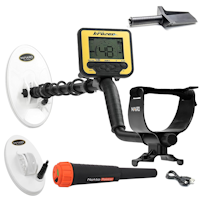 Retails for Approximately $670
Retails for Approximately $670
– Frequency: 61 KHz
– GK26C Search Coil 26 cm x 14 cm (10″x5.5″) & Search Coil Cover
– GK19 Search Coil 19 cm x 10 cm (7.5″x4″) & Search Coil Cover
– 2.4 GHz Wireless Headphones (Green Edition)
– High frequency for small gold.
For more information on Nokta metal detectors check out NoktaDetectors.com
Garrett Goldmaster 24k Metal Detector
 Retails for Approximately $680
Retails for Approximately $680
– Frequency: 48 KHz
– Waterproof 6″ x 10” Goldmaster 24K DD Coil
– 3-Year Warranty
– Choose from 2-tone “Beep” Mode to help distinguish target types or the Standard VCO “Zip” Mode, where audio pitch and volume rise as signal strength increase.
– Adjustable Iron Cancel
For more information on Garrett metal detectors check out Garrett.com
Garrett AT Gold Metal Detector
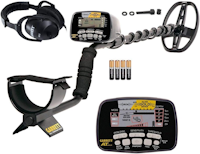 – Retails for Approximately $640
– Retails for Approximately $640
– Frequency: 18 KHz
– All Terrain- Designed for use in wet, humid and dusty environments. Weatherproof housing can be immersed in water to 10-foot (3m) depth.
– Digital Target ID- Numeral scale from 0 to 99; indicates a target metal’s conductivity for increased ability to distinguish targets from each other.
– High-Resolution Iron Discrimination- Provides 40 points of iron resolution—controlled with touch pads and viewed as a digital number on the LCD—for the most precise ability to separate a good target from iron trash.
– Versatile and reliable.
For more information on Garrett metal detectors check out Garrett.com
Fisher Gold Bug Pro Metal Detector
 – Retails for Approximately $400
– Retails for Approximately $400
– Frequency – 19 kHz
– 5″ And 10″ Dd search coils
– 5″ Waterproof Search coil
– 5-Year Warranty
– Affordable and effective for beginners.
– Made in the USA
For more information on Fisher Labs metal detectors check out Fisher Lab Metal Detectors
The Bounty Hunters listed below are scraping the bottom of the gold prospecting barrel, to be honest. At best, they may help you hone in on gold. These are geared more toward treasure hunting like rings, empty cans and soda can tabs. But you never know. You just might get lucky
Bounty Hunter TIMERANGER Metal Detector
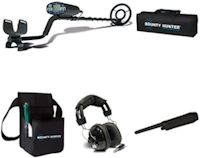 – Retails for Approximately $300
– Retails for Approximately $300
– Frequency: 6.6 kHz
– Fully submersible with an 8-inch waterproof search coil
– 5-year limited warranty
– 4 professional operating modes
– 3-Tone Audio Discrimination
– Target-ID and depth readout
– Made in the USA
For more information on Bounty Hunter metal detectors check out Bounty Hunter Metal Detectors
Bounty Hunter Quick Draw II Metal Detector
 Retails for Approximately $130.00
Retails for Approximately $130.00
– Frequency: 6.6 kHz
– 8″ Concentric Search Coil
– 5-Year Warranty
– LCD Display with Numerical Depth Readout
– Maximum Coin Detection Depth: 8″
– Adjustable Sensitivity
– 3 Search Modes
– Made in the USA
For more information on Bounty Hunter metal detectors check out Bounty Hunter Metal Detectors
Bounty Hunter Tracker IV Metal Detector
![]() Retails for Approximately $95.00
Retails for Approximately $95.00
– Frequency: 6.6 kHz
– Fully submersible with an 8-inch waterproof search coil
– 5-year limited warranty
– Made in the USA
– Budget-friendly option.
For more information on Bounty Hunter metal detectors check out Bounty Hunter Metal Detectors
Secret #5 – Best Locations for Metal Detecting For Gold
Choosing the right location is critical when metal detecting for gold. Here are some prime spots to consider:
- Historic Gold Mining Areas: Old mining sites are often rich in undiscovered gold. Researching local history can guide you to these lucrative locations.
- Riverbeds and Streams: Gold naturally settles in riverbeds and streams. Areas where water flow slows, such as bends and behind large rocks, are excellent places to search.
- Deserts: Many deserts, especially in the southwestern United States, have a history of gold production. Dry washes and arroyos are prime spots for gold metal detecting.
- Beaches: While not as common, some beaches have been known to yield gold nuggets, particularly after storms that shift the sands.
Secret #6 – Techniques for Effective Metal Detecting For Gold
Employing the right metal detecting for gold techniques can significantly increase your success rate in finding gold. Here are some strategies to consider:
- Grid Search: Divide your search area into grids and systematically scan each section. This ensures you cover the ground thoroughly and do not miss any potential targets.
- Slow and Low: Swing your detector slowly and keep the coil close to the ground. This maximizes the detector’s sensitivity and depth penetration.
- Listen Carefully: Pay attention to faint signals. Gold nuggets often produce weak signals, so using headphones and focusing on subtle sounds is essential.
- Dig Everything: Initially, dig all signals to understand your detector’s responses to different targets. Over time, you will learn to distinguish between gold and other metals.
Secret #7 – Metal Detector Maintenance
When it comes to caring for your metal detector, regular maintenance is key. Keeping your metal detector clean and performing at its best is essential for optimal treasure-hunting results. When you are done with your metal detector for the day, remove any dirt, debris, or moisture from the device to prevent rusting or damage. Secondly, REMOVE THE BATTERIES when not in use! Batteries can corrode and if they corrode in place, that’ll mess up the contacts. Regular cleaning and inspection of your metal detector can help extend its lifespan and ensure accurate target detection.
Proper care and maintenance of your metal detector is crucial to ensure its longevity and optimal performance. One important aspect of caring for your metal detector is storing it properly when not in use. By following a few simple steps, you can protect your investment and extend the life of your detector.
Metal Detecting Code of Ethics.
Is there an official code of ethics for metal detectorists? Honestly, I don’t know if there is, but here are a few metal-detecting guidelines to follow.
- Don’t hurt yourself. Practice SAFETY and BE ALERT & AWARE of your surroundings. Think about it. You’re walking around with headphones on outdoors while focusing in on that short space right in front of your feet and oblivious to the sounds near you as you concentrate. There are trip and fall hazards, rattlesnakes, swarming bees, and more that can hurt or kill you if you get careless. BE ALERT AND AWARE!
- Don’t disturb regular people or other metal detectorists. Be polite and respectful.
- Be helpful to beginner metal detecting enthusiasts. If you’re good at metal detecting for gold, by all means, share your knowledge and experiences with others.
- Learn & respect the law of the current state, county, and city.
- Get Permits if required to metal detect on public property.
- Get Permission to metal detect on private property.
- Consider sharing your archeological finds with local museums.
- Don’t destroy buildings, properties, or ghost towns.
- Use the right digging techniques and don’t leave holes. Like camping, you want to “leave no trace”. If you dig a hole, fill it back in. This goes back to my rule #2 which is, “Be polite and respectful.“
- Take away the trash. Be considerate and take away all the trash you find in the area you are detecting in. Leave it in better condition than you found it in.
- Report dangerous places to the authorities.
Secret #8 – Tips When Metal Detecting For Gold
To enhance your gold metal detecting experience, consider these additional tips:
- Buy The Best Metal Detector You Can Afford: Even if you are working on a small budget, get the best detector you can afford. Don’t scrimp when it comes to quality. It only means you’ll have to spend even more money to upgrade in the future.
- Respect Local Regulations & Laws: Always seek permission before detecting on private land and adhere to local laws and regulations regarding metal detecting for gold and other minerals.
- Do Your Research: Learn about the geology of the area you plan to search. Understanding the types of rocks and soils that commonly host gold can help guide your efforts to success.
- Join Clubs: Metal detecting clubs and forums are great resources for learning from experienced prospectors. They can offer advice, share locations, and provide camaraderie. For more information, visit the Roadrunner Prospector’s Club, The Desert Gold Diggers, or the Arizona Association of Gold Prospectors to learn more.
- Stay Persistent: Patience and persistence are key. Finding gold or any precious metal while metal detecting for gold can often be challenging. It may take time before you achieve significant results.
- Know Your Equipment: Familiarize yourself with your metal detector and its settings. Regular practice will improve your technique and increase your chances of success.
- Keep The Coils Parallel To The Ground: Sometimes you might tend to accidentally lift your coil at the end of a sweep, but be careful to avoid this, as you are losing potential targets.
- For Relic Hunting: Look for the local hot spot. Visit the library, local historians, and your city hall to find out about historic places in your city and then start searching there to find relics.
- Detect After It Rains: Wet ground is much better suited for conductivity and it will make it much easier to find treasure hidden deep below the surface if the ground is wet.
- Keep A Record Of Your Finds: Every time you go hunt or metal detecting for gold, keep a record of where you went and what you found. This will help you keep track of your sites and rotate them accordingly.
- Choose Comfortable Headphones: You’re going to be wearing them for a while so you don’t want your ears to feel itchy and irritated.
Closing Thoughts on Metal Detecting for Gold
Metal detecting for gold is an exciting pursuit that combines adventure, history, and the potential for valuable discoveries. By investing in the right equipment, choosing optimal locations, employing effective techniques, and following expert tips, you can increase your chances of success in finding gold and other treasures.
Happy METAL DETECTING FOR GOLD!

